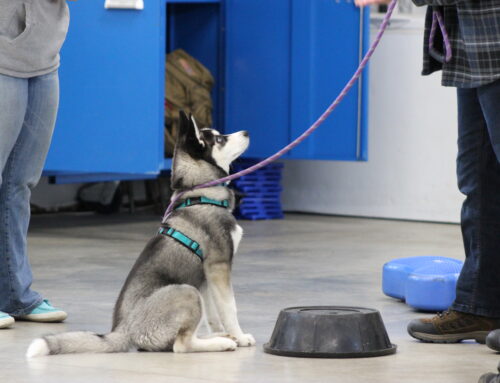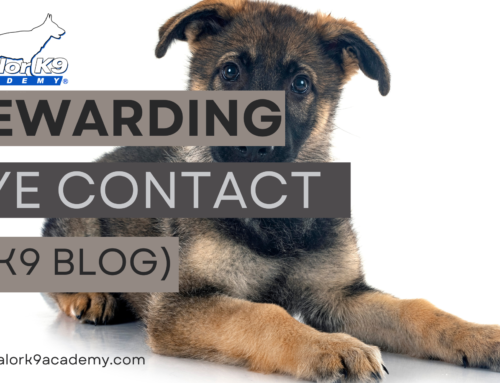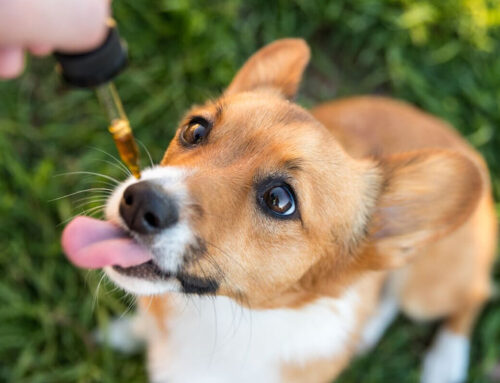I recently posted the following on social media:
You won’t see a well-bred purebred dog in the shelter. Why? Because well-bred dogs come from reputable breeders. And reputable breeders ALWAYS take their dogs back.
This sparked a great discussion and some backlash from people saying that purebred dogs end up in the shelter all the time. Yes, they do. But I said well-bred purebred dogs. The difference is in the words “well-bred,” and there seems to be some confusion as to what makes a dog well-bred. So let’s talk about that! What makes a breeder reputable? And what do reputable breeders have in common?
1. Reputable breeders health test their dogs.
I’m not talking about a trip to the vet where they get a wellness check. That’s not health testing. That’s just basic dog ownership. I’m talking about health testing against genetic diseases to ensure their breeding stock is sound. The health testing can be basic or complex depending on the breed.
For German Shepherds, for example, this includes the following at minimum:
- Hip X-Rays (which are then sent to the SV, PennHIP or OFA for official ratings)
- Elbow X-Rays (same as above)
- Full DNA panel (to test for 215+ congenital health issues, including Degenerative Myelopathy)
In other breeds, like the Golden Retriever, breeders will do the above plus:
- Cardiac Evaluation (registered with OFA)
- Eye Certification – CAER (registered with OFA)
- Ichthyosis
- NCL5
- and PRA 1, 2 and prcd – an inherited eye disorder
(Source: https://www.gooddog.com/breeds/golden-retriever/health-testing-guide)
And some breeders will check hips and elbows at a year of age, and then again at 2 or older, so that they have a clear idea of what their dog looks like genetically (at a young age) and how their dog holds up as they age. My German Shepherd’s sire was health tested before breeding (around two years of age) and again at nine years of age. They did a PennHIP on him and he scored in the top 10% of the breed. At nine years of age! That’s impressive!
Health testing goes above and beyond “My dog is healthy.” We’re talking health at the cellular level, because that’s the health that’s passed on from generation to generation.
2. Reputable breeders choose dogs from health tested lines.
You have to look at more than just the mom and dad dog (dam and sire) to know if puppies are going to be healthy and sound. For this reason, reputable breeders only choose dogs to join their program that come from fully health tested lines. Three, four, five and more generations back the dogs in their dogs’ lines are passing all their health testing with flying colors. This means the pups they produce have the best chance of living a long and healthy life.
3. Reputable breeders study lines carefully.
It takes more than “I have a dog and you have a dog, so let’s breed” to produce sound pups. You have to know your dogs’ bloodlines. And you need to know everything you can about the breeding stock you’re choosing to pair your dogs with. It’s so much more than people realize. No good breeder ever posts online searching for a stud because “my dog is coming into heat any day now.” That just doesn’t happen. More than that, reputable breeders plan years in advance to perfectly select the right dog to join their program based on a dog or dogs they already have in mind for a solid pairing. Other breeders will travel around the world to pair their dog with a complementing stud.
In studying lines, they know which dogs produce which traits, which dogs produce themselves, and which dogs don’t, which dogs have desirable traits and which dogs don’t. It’s a never-ending puzzle of “this dog” and “that dog” and it gets really complicated really fast. In studying German Shepherd bloodlines, I’ve learned that pedigrees are like onions. Every time you peel back a layer, you find another layer and another layer. It’s never ending! And fascinating. And complicated. It takes dedication and the determination to never overlook something undesirable in the quest for a great pairing.
Dog aggression, human aggression, dominance, submissiveness, handler sensitivity, hard dogs, sharp dogs, possessive dogs…prey drive, hunt drive, food drive, pack drive, defense…eagerness to please, stubbornness, hardness, softness…they’re ALL genetic traits. All of them! And if you pair one dog with an undesirable trait to another dog whose great-grandfather on the paternal side also had that undesirable trait…you can end up with puppies who inherit that trait. It goes the same way with good traits. And sometimes you can’t produce only the perfect traits, so you choose the lesser of the two evils because no dog is perfect and no lines are perfect.
And that circles back to, what are you trying to produce and for what homes? Which brings us to point #4.
4. Reputable breeders won’t sell to just anyone.
They’ve dedicated their lives to breeding, and they’re wholly invested in preserving their dogs’ lines. They’re not going to sell to some Joe Schmo just because he has cash in hand. They interview their buyers as much as, if not more than, their buyers interview them! They research you just like you research them. And they have no problem turning away a buyer if they feel the buyer’s wants, needs and lifestyle aren’t a good fit for their breed.
Why? Because their reputation is at stake. (It’s the same reason we will turn away training clients. Throwing money at your dog’s issues isn’t going to fix them. You have to be invested too! We turn away clients often who are unwilling to make changes and invest in their dog’s positive training outcome.)
5. Reputable breeders have proven dogs.
What do I mean by proven? I mean their dogs aren’t “beautiful” and “funny” and “great with kids” as some breeders will put in their bios. They know their breed and they know what the dog is bred to do. Their proof is in the pudding. If they have a working breed, their dogs work. They possess the traits (drives, temperament, character) to do the job at hand. And this proof can be in the form of working titles (IGP, Schutzhund, PSA, herding, barn hunt, nosework, agility, etc) or in the form of video proof of their dogs’ abilities.
Shouldn’t all breeders title, you ask? I used to think so. But I’ve since learned that many breeders simply don’t have the time or the ability to breed, train and title dogs. Breeding is a full-time job in and of itself! Their dogs can do the work, and many hire trainers to title their dogs for them (train, travel, compete). But all breeders don’t title, and that’s fine. And those that do usually title their males (since titling males is more common and easier to do than titling females, due to heat cycles and breeding).
Some breeders have titles on both their males and their females, and that’s always impressive and preferred.
Simple saying “My dog can work” is different from proving that your dog works.
6. Reputable breeders avoid kennel blindness as much as possible.
It’s hard. You work for years to select a dog to join your program, and then something happens that could disqualify your dog from breeding. Maybe it’s a temperament issue, or the inability to pass a certain health test that’s optional for the breed but not required. It can be tempting to say, “Well, no dog is perfect so I’ll let it slide” and breed anyway. Reputable breeders don’t do that.
They will only breed the best of the best, even if that means a dog never makes it to the point of actually being bred. I’ve known countless breeders who ended up spaying or neutering a dog because it wasn’t good enough.
Many breeders accept “good enough” as good enough, and they breed anyway. Reputable breeders don’t just breed them anyway. They’re open to feedback and constructive criticism, and they oftentimes have other breeders in their corner who can give them their honest opinion and who can look at their dogs and lines with a trained eye. Good breeders open themselves up to criticism, so that they don’t overlook a flaw in their dogs or programs because they’re too close to them/it.
I have never bred, but I have considered it. And I have spent countless hours on the phone with esteemed, reputable breeders talking to them about their breeding programs, the dogs I have, and what they think about certain pairings.
Reputable breeders are willing to scrap their plans if something doesn’t add up. They won’t sacrifice quality for their own selfish desires.
7. Reputable breeders always offer a contract.
They have a well thought-out contract that lays out expectations for both sides (breeder and buyer). And that contract includes a health guarantee, spay/neuter clause, breeding rights, care, food and other quality of life expectations.
It also includes a First Right of Refusal, which means that, if for any reason the buyer is unable to keep the dog, the breeder has first right of refusal to re-take possession of the dog. And reputable breeders always take their dogs back for life.
Their goal is to ensure that communication is clear, and that their dogs are always well-loved and cared for at every age and stage of the dog’s life.
8. Reputable breeders don’t offer full registration outright.
With the exception of some international breeders who know they don’t have control over what happens to their puppies after they’re shipped to another country, reputable breeders don’t give buyers breeding rights at eight weeks of age. Their dogs are always registered (usually AKC, unless they’re international) and they always provide paperwork immediately for their dog. But it’s always Limited Registration (no breeding rights). They may choose to give their buyers breeding rights at two years of age, but only after certain requirements are met. Typically these requirements include:
- Health testing (as stated in #1)
- Working titles
- Show titles (conformation)
- And proof of temperament
Then, and only then, does the breeder sign off on Full AKC Registration for that dog, so that the owner of the dog can breed it. Reputable breeders don’t sell full breeding rights for an added fee at eight weeks of age. They’re way too invested in their progeny’s outcome to do that.
9. Reputable breeders don’t advertise on Craigslist, etc.
They just don’t. Their dogs are usually spoken for months, and in some cases, years in advance. They don’t sell their puppies in parking lots. They don’t sell them to pet stores. They don’t sell them to Joe Schmo just because he wants a dog. Reputable breeders carefully select their buyers just like mindful buyers carefully select their breeder.
They don’t sell entire litters to one person.
They don’t price their dogs based on color.
They don’t put up signs next to the road advertising their pups for sale.
They just don’t.
10. Reputable breeders breed within the standard.
What do I mean by this? They know the standard for their breed’s size, temperament, conformation and abilities, and they breed to it. Whether you like it or not. They’re not breeding to please people and produce the next Internet sensation. They aren’t breeding oversized dogs or dogs with exaggerated features like huge chests or excessive slopes and angulation. They’re breeding for form and function.
It’s a damn shame what showline breeders are doing these days with German Shepherds. The roached back they’re producing is horrible! The dogs have an excessively-sloping topline behind the withers. German Shepherds are supposed to have correct, level backs not a dramatic back angle that’s shaped like a curvy banana.
German Shepherds should look like this:
![]()

Not this!

As for weight, give or take a few pounds (no more than 10 percent), the dog should fall within the breed standard. German Shepherds are not supposed to be 140 pounds! Females should be 55-75, and males should be 65-85. That’s it!
Reputable breeders aren’t looking to produce non-standard colors. Liver and silver for German Shepherds, silver for Labs, they’re not acceptable colors.
To read more about the standards for German Shepherds, click here: https://www.germanshepherddog.com/about/german-shepherd-dogs/breed-standards/
It covers:
- General appearance
- Character
- Head
- Lims
- Hindquarters
- Gait
- Coat
- Colors
- and more!
In detail! A well-bred German Shepherd falls within certain, specific parameters as breed creator Max von Stephanitz intended.
Bottom line: Breeding is an art. It’s a science, and it takes absolute dedication and a complete commitment to not just breeding, but breeding correctly and for the right reasons. Breeders are a dime a dozen. Anyone who breeds a male dog and a female dog is called a breeder.
Reputable, ethical breeders are a rarity. They’re unlike the rest. And I’d argue that less than 10 percent of breeders can be considered reputable.
To see my list of reputable German Shepherd breeders, click here!
For Golden Retriever breeders in the Boise area, click here!
Someday I’ll put together a complete list of ethical breeders (to the best of my ability, of course, and remember, people change, programs change, nothing is forever). Have breeders you’d like to add? Email me at info@valork9academy.com.
I hope you enjoyed this blog post.







Leave A Comment